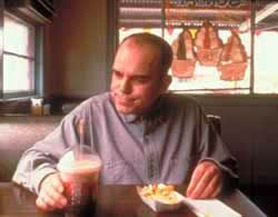Viking Night: Sling Blade
By Bruce Hall
September 13, 2012
The credit for that goes to Thornton, who writes, directs and stars in this remarkably effective parable about the things good and evil have to have in common to be what they are. There are eddies of morality all through Sling Blade, along with a broad emphasis on tolerance. Karl, of course, must reconcile with his past. Doyle is the one with the real disability; walking around with that kind of anger is a lonely way to live, and a crushing burden on those around you. Yes, it hangs around about 15 minutes too long and it dabbles a bit much in artifice, but Sling Blade tells a pretty compelling story about some pretty compelling people.
What could easily have been an overly sentimental fluff piece boasts a pretty tight script that at times wanders near the edge of credibility, but rarely past it. The performances are much the same. When Karl first speaks, you'll chuckle at his underbite and frown at his off putting habits. But Thornton opens with a gripping monologue from the mind of a confused boy, betrayed by his parents and ostracized by his peers. You hear a lonely man who should be bitter, but knows the Bible pretty well and holds himself accountable for his actions. Forgiveness and atonement are the name of the game here, and If anyone should be as angry as Doyle it's Karl - but he’s not.
And speaking of Doyle…people...Dwight Yoakam can freaking act. I couldn't name even one of his songs but brother, can he deliver a line. The late John Ritter has little to do but bring dignified charm to Vaughan, but this he does, and he does it well. And Lucas Black, who grew up to be Fast and Furious, isn't half bad. Come to think of it, he probably turned in what remains the best work of his career sitting at Billy Bob Thornton's feet, kicking at the dirt and being convincingly conflicted. But it’s the story that drives things forward here, and the actors’ jobs are made easier by a great screenplay that pulls at your heart just hard enough to hurt without yanking it out altogether.
My primary criticism of Sling Blade is a silly one, but it happens to be a pet peeve. There’s a LOT of eating in this film. In over half the scenes, someone is eating something. This has the unintended effect of accentuating the unrealistic way actors pick at their food in scenes where they might be called upon to speak. What’s worse is that the film takes place in rural Arkansas, where the food is heavy and delicious, so nobody actually eats like that. Someday my favorite director is going to be whoever can coach performers on how to eat realistically on screen and still deliver their lines.
A small quibble, but it is what it is. I’ve never sat in front of a plate of fried chicken, biscuits and gravy and picked at it like a debutante, and neither have you.
On the whole, Sling Blade is essentially just another "special person changes lives" movie. On many levels it’s not much different than Rain Man, or Forrest Gump. Or What's Eating Gilbert Grape. This certainly isn't the first time you've seen this film, or some variation of it. But it’s one of the better examples and when something works, it works. And Sling Blade works - it is moving, gripping, and full of heart. You care when the right characters are wronged, and you feel smug satisfaction when justice is done. It gets a little carried away from time to time, but redemption and self discovery are hard to pull off without a little cheese. You should forgive both Karl and Sling Blade for their shortcomings, because they both deserve your admiration.
Continued:
1
2
|
|
|
|




